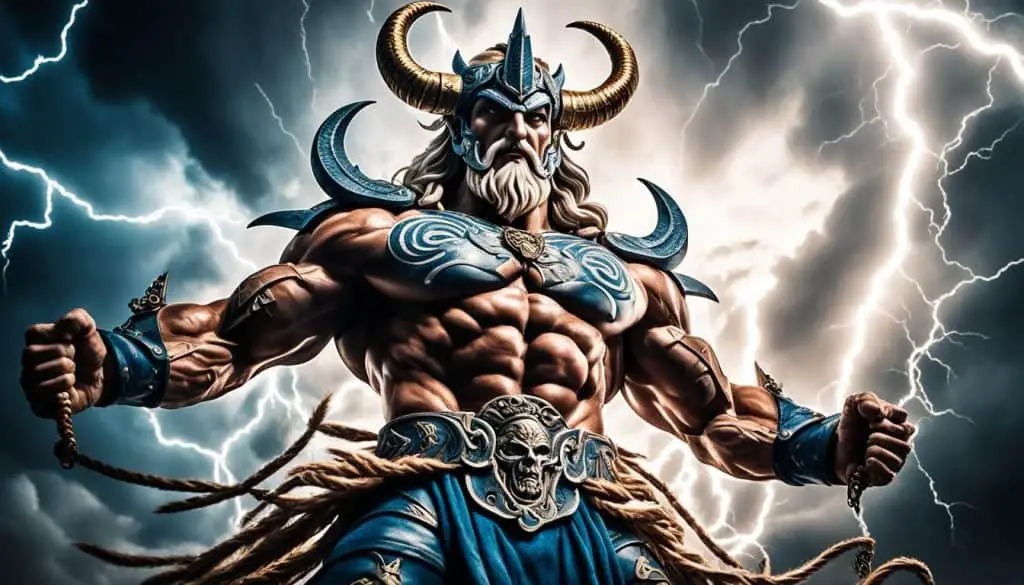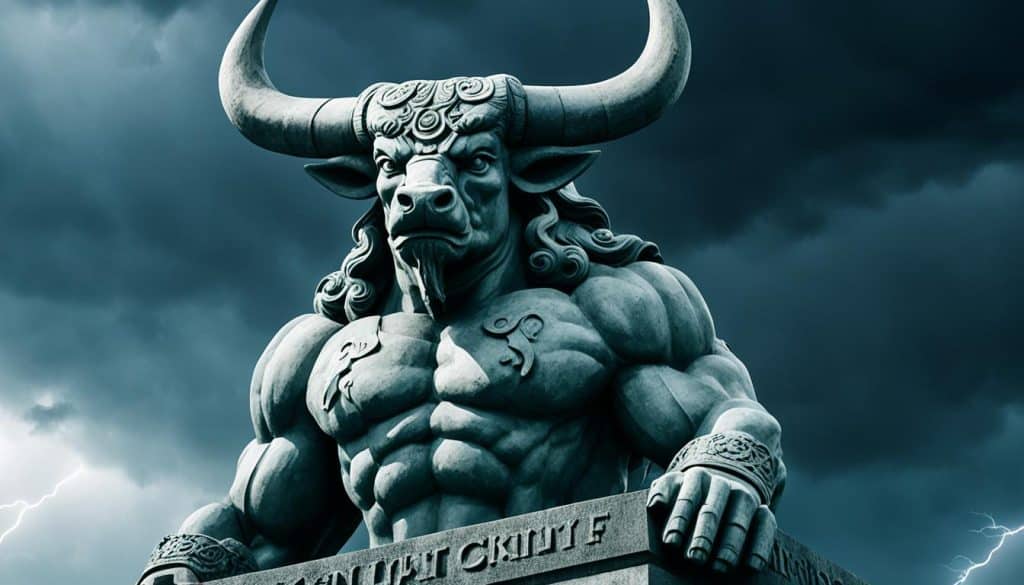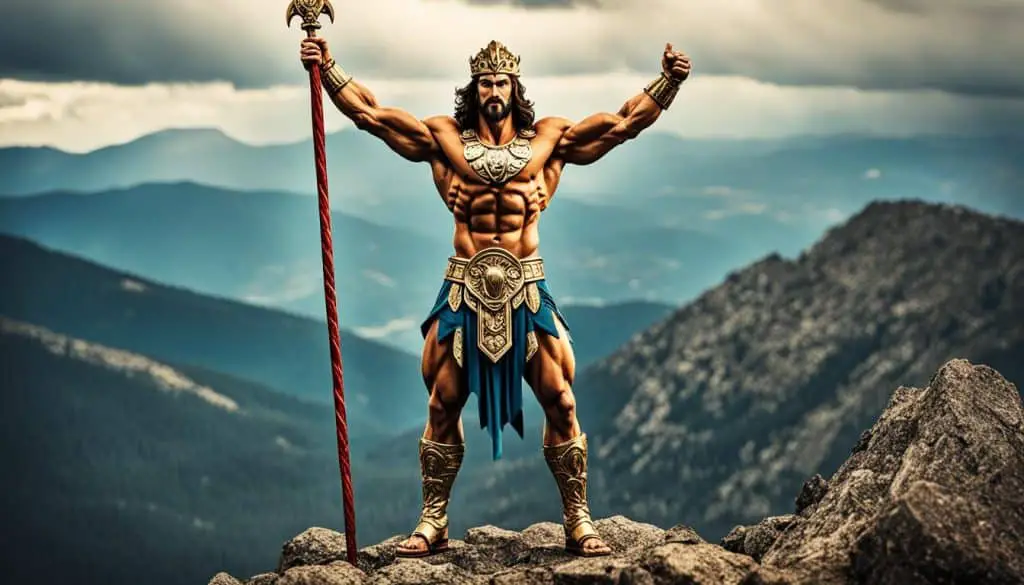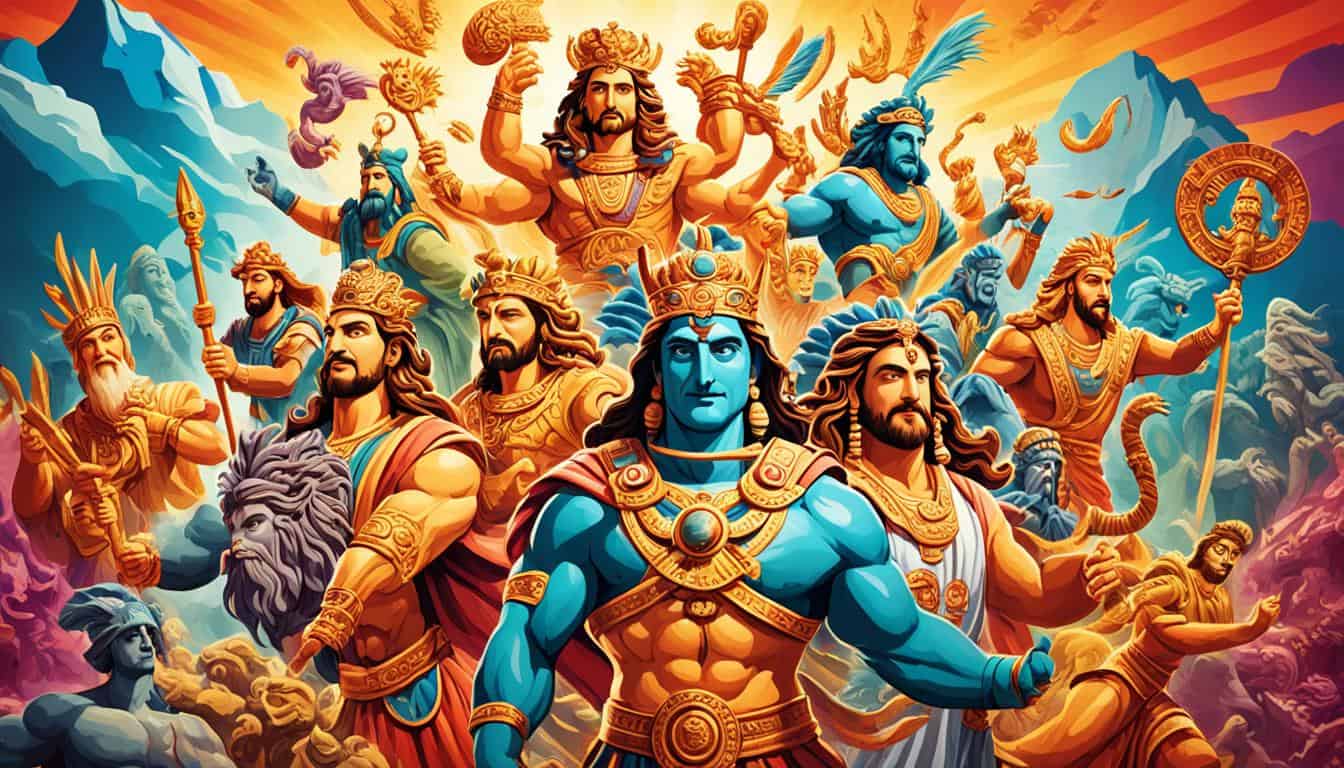Table of Contents
Ever thought about how foreign gods impacted ancient Israelites? Did belief in one true God ever conflict with these foreign deities? Let’s explore the stories in the Bible where foreign gods play a part. These tales show their influence on culture and the consequences of worshipping them.
Join our adventure through the Biblical accounts. We will delve into the stories of Asherah, Baal, Molech, Chemosh, Dagon, Ashtoreth, Nebo, Milcom, Baal-Zebub, and the Queen of Heaven. Learn about the hidden meanings and cultural clashes in these ancient writings.
Discover the roots, meanings, and outcomes of interacting with foreign gods. Find out why God bans worshipping these figures. And how the Israelites struggle to stay true to their monotheistic faith. All despite the pull of these mighty entities.
Get set for a journey that’ll make you rethink your views. We’re off on an exciting tour of ancient Israelite society. Heeding the thrilling encounters between foreign gods and the followers of Yahweh.
Asherah & Other Canaanite Gods (Exodus 34:12-17)
God gave the Ten Commandments to the Israelites. They warn against worshiping Canaanite gods like Asherah. Asherah was the mother goddess in Canaanite stories. She was seen as the wife of El, their chief god. People looked to her for help with having children, staying safe, and getting wealth.
A passage in Exodus 34:12-17 tells the Israelites not to follow foreign gods. They are told to break the altars and pillars of Canaan’s gods. Destroying these things was meant to show Israel that only Yahweh should be their God.
Other Canaanite Gods
The Canaanite gods were part of a large group. Asherah was just one of them. Here are some others and what they were known for:
- Baal: The Canaanite god of storms, fertility, and agriculture.
- Anat: The sister and consort of Baal, associated with war and hunting.
- El: The chief god of the Canaanite pantheon, often referred to as the father of the gods.
- Astarte: The goddess of love, beauty, and sexuality.
- Dagon: The god of grain and fertility, worshipped by the Philistines.
The Battle Between Yahweh and the Canaanite Gods
The fight between Yahweh and the Canaanite gods shows a bigger religious conflict. This battle was for control over ancient Israel. While it was a challenge to stay true to Yahweh, the Israelites chose to worship only him. This choice is seen in the removal of Canaanite worship symbols.
Stories about foreign gods in the Bible help us understand ancient Israel’s culture and faith. They highlight Yahweh’s demand for complete loyalty. They also talk about the results of breaking the promises made between God and the Israelites.
Want to know more about the Bible’s foreign gods and their impact? Keep reading to learn about Baal, Molech, Chemosh, Dagon, and others. Their stories show how the Israelites stayed strong in their belief in Yahweh, despite the challenges.
Baal (Judges 2:10-13)
After Joshua passed away, the Israelites were in a tough spot. They stopped following Yahweh and started worshiping Baal, a god of fertility and storms. This switch upset God because Baal was a foreign god. It went against their agreement with Yahweh.
For not obeying, the Israelites faced trouble from their enemies. They were left weak and hopeless. Baal couldn’t help the Israelites, even though others respected him.
The Israelites turned from God’s warnings and chose Baal’s false promises instead.
Idol worship led to a drop in Israel’s spiritual and ethical standards. They fell into a pattern of turning from God and suffering the consequences. They later realized their mistake in leaving the one true God for Baal’s empty promises.
The story of Baal is a lesson. It warns us against leaving our faith and the dangers of turning to other gods. This story shows how important it is to stay dedicated to God and not give in to the world’s temptations.
Relevance of Baal
The worship of Baal echoes into our lives today. It reminds us of the negative effects of turning to false gods. This choice can damage a society’s values and well-being.
Choosing Baal represented a change in the Israelites’ beliefs and priorities. They lost God’s blessings by picking Baal’s worship. This left them open to struggles ahead.
This story asks us to look at our own lives. It challenges us to see where we place our values. Let’s not let our desires lead us away from God. Our choices can deeply affect us and the world.

Learning from Baal’s story, we see why faithfulness to God is crucial. By following God, we gain true joy, security, and direction in life.
Molech (Leviticus 18:21)
Molech is a foreign god who asks for child sacrifices in the Bible. The Bible clearly says that offering children to Molech defiles God’s name. It gives a strong warning against such evil acts.
“You shall not give any of your children to offer them to Molech, and so profane the name of your God: I am the Lord.”
The Bible doesn’t explain Molech worship in detail. But, historical documents show it might have included burning kids alive as sacrifices. The idea of killing innocent children to please a god is against love and respect for life.
The Bible mentioning Molech reminds us of the harm in such rituals. It shows the need to follow morals and protect the weak.
Giving in to worship Molech was strictly off-limits for the Israelites. This was part of their laws to keep true to God and reject harmful acts, like human sacrifice.
The Consequences of Molech Worship
Sadly, some Israelites did worship Molech despite the warnings. They offered their children as sacrifices. The Bible tells us that this led to serious negative effects. In Jeremiah 32:35, it’s said:
“They built the high places of Baal in the Valley of the Son of Hinnom, to offer up their sons and daughters to Molech, though I did not command them, nor did it enter into my mind, that they should do this abomination, to cause Judah to sin.”
This message underlines how bad Molech worship was and its destructive impact on the Israelites. It talks about how it led to their downfall.
Discussing Molech in the Bible is meant to remind us of the value of life and good moral choices. It condemns child sacrifice and urges us to honor the one true God. This God cares deeply for all lives.
Chemosh (1 Kings 11:7)
The story tells about King Solomon and his impressive wisdom. Despite his wisdom, he allowed his foreign wives to worship their gods. This included Chemosh, Moab’s national god, and it caused trouble for Israel.
Chemosh was the Moabite’s god, a close neighbor to Israel. Kings of Moab would offer sacrifices to gain Chemosh’s favor. This was because they believed Chemosh protected and provided for their nation.
Solomon’s decision to let worship of foreign gods happen showed he wasn’t completely faithful to his own God. This action of worshiping idols led to problems in the kingdom, as God’s judgment followed.
“So Solomon did evil in the eyes of the Lord; he did not follow the Lord completely, as David his father had done. On a hill east of Jerusalem, Solomon built a high place for Chemosh the abomination of Moab, and for Molek the detestable god of the Ammonites.”
1 Kings 11:6-7 (NIV)
Worshiping Chemosh turned people away from Yahweh, Israel’s God. It broke the covenant God had with his people. This sin caused the kingdom to split and their exile later on.
This story warns us about compromising our faith. It shows the importance of being loyal to God and not following after false gods.

Continue reading to discover the impact of another foreign god mentioned in the Bible: Dagon (1 Samuel 5:1-5).
Dagon (1 Samuel 5:1-5)
The Philistines were excited because they had taken the Ark of the Covenant from the Israelites. They put it in their temple next to the large statue of Dagon, their fertility god. But soon, something strange happened. Dagon fell down in front of the Ark. The next day, Dagon not only fell again but also broke, with just a part of him left.
This story is from 1 Samuel 5:1-5. It shows that Dagon, the Philistines’ god, was weak. God, Yahweh, showed his power by making Dagon fall and break.
“And when the people of Ashdod rose early the next day, behold, Dagon had fallen face downward on the ground before the Ark of the Lord. So they took Dagon and put him back in his place. But when they rose early on the next morning, behold, Dagon had fallen face downward on the ground before the Ark of the Lord, and the head of Dagon and both his hands were lying cut off on the threshold. Only the trunk of Dagon was left to him.” (1 Samuel 5:3-4)
This amazing event shows that Yahweh is the God of all. No other god, even one as important as Dagon, can stand against him. It was clear who was truly powerful.
It also warns about being too proud. The Philistines quickly went from feeling proud about capturing the Ark to being humiliated. Their god, Dagon, couldn’t protect himself or his honor. This story reminds us why challenging Yahweh is not wise.

| Characteristics | Symbolism |
|---|---|
| Bearded male deity | Represented fertility, grain, and agriculture |
| Half-man, half-fish form | Associated with marine elements, reflecting the Philistines’ coastal lifestyle |
| Human and fish-like hybrid | Characterized the transition from land to sea, indicating Dagon’s dominion over various realms |
Looking at Dagon’s story, we see the real power of the one true God. It warns us about worshiping other gods. In the end, God is the only one who is always in charge.
Ashtoreth (1 Kings 11:5)
We’re diving into foreign gods in the Bible, meeting Ashtoreth. She’s a fertility goddess tied to war and sex, introduced to Israel by one of Solomon’s wives.
“And Solomon went after Ashtoreth the goddess of the Sidonians, and after Milcom the abomination of the Ammonites.”
She was mainly worshipped by Canaanites and Phoenicians. Her temples were centers for special rituals. Ashtoreth’s place among the Israelites shows how tempting foreign gods were.
Ashtoreth’s worship linked fertility with power and sex in ancient times. She was seen as bringing life’s abundance to crops and animals. People also believed she protected warriors.
Her link to sex meant her ceremonies included sacred prostitution. This was for better fertility, even though Yahweh opposed her worship in the Bible.
Foreign gods like Ashtoreth challenged Israel’s faith. They had to choose between these gods and their promise to Yahweh. It warns against abandoning what we believe.
Symbolism and Iconography
Ashtoreth’s ancient depictions varied. She could be a seated goddess or a figure with many arms. These showed her roles in different cultures.

Ashtoreth in Scripture
She appears several times in the Bible, reflecting her importance in the area’s religion. Besides Solomon’s wife, others in the Bible also mention her. This underscores her deep influence in ancient times.
- 1 Kings 11:5
- 1 Kings 11:33
- 2 Kings 23:13
- Judges 2:13
Nebo (Isaiah 46:1)
Nebo, a Babylonian god, is talked about in the Bible. Isaiah 46:1 shows how Nebo and other gods are nothing compared to Yahweh’s power.
Nebo was seen as the god of knowledge, writing, and learning in ancient Babylon. He was linked to the planet Mercury and was thought to write down the gods’ plans. Babylonians deeply respected Nebo and made temples for him. They looked to him for advice and luck.
In the Hebrew Bible, Nebo is called a weak idol. The Bible compares Nebo with Bel (Marduk), highlighting their powerlessness next to Yahweh. Yahweh was the true God for the people of Israel.
“Bel bows down; Nebo stoops; their idols are on beasts and livestock; these things you carry are borne as burdens on weary beasts.” – Isaiah 46:1 (ESV)
The Bible paints the Babylonian gods, like Nebo, as weak against Yahweh’s strength. It reminds the Israelites to trust only in the one real God.
Comparison of Nebo and Yahweh
| Aspects | Nebo | Yahweh |
|---|---|---|
| Power | Regarded as strong by the Babylonians | Seen as almighty and powerful by the Israelites |
| Role | God of wisdom and learning | The true God, creator of everything |
| Worship | People consulted oracles in his temples | Followers make offerings and pray |
| Effectiveness | Idols could not help their worshipers | Shows miracles and gives direction in history |
This table shows how different the views of Nebo and Yahweh are. Nebo, despite his Babylonian worship, is shown to be weak next to Yahweh.

The Bible’s clear message is Yahweh is greater than false gods like Nebo. It warns that relying on idols will only disappoint.
Milcom (1 Kings 11:33)
Exploring the Bible’s foreign gods, Milcom (1 Kings 11:33) stands out. He was an Ammonite god worshiped by some in Israel. King Solomon’s wife favored Milcom. This led to Israel’s downfall.
Milcom wasn’t just for the Ammonites. Nearby lands like Israel also worshipped him. He stood for both fertility and war. People believed worshiping Milcom would bring prosperity and safety.
“Milcom…an abomination of the Ammonites” – 1 Kings 11:33
King Solomon’s wives brought idolatry into Israel. This was against Israel’s belief in one god. It caused the kingdom to weaken and split.
The Milcom story warns about unfaithfulness to God. It warns of straying from true worship. (1 Kings 11:9-10)
Impact on Israelite Society
Milcom’s worship changed Israel’s religious scene. It weakened worship of Yahweh, Israel’s main belief.
Milcom’s worship mixed in with Ammonite rites. This made Israel deviate from monotheism. It undermined their society and morals.
In summary, accepting foreign gods weakened Israel. It led to a spiritual and societal decline. This caused the kingdom’s division.

| Foreign God | Influence |
|---|---|
| Asherah & Other Canaanite Gods | Challenged Israelite monotheism (Exodus 34:12-17) |
| Baal | Invoked God’s anger and led to oppression (Judges 2:10-13) |
| Molech | Forbiddencild sacrifice (Leviticus 18:21) |
| Chemosh | Introduced through Solomon’s foreign wives (1 Kings 11:7) |
| Dagon | Humiliated before the Ark of the Covenant (1 Samuel 5:1-5) |
| Ashtoreth | Associated with war and sexuality (1 Kings 11:5) |
| Nebo | Depicted as powerless before Yahweh (Isaiah 46:1) |
| Milcom | Ammonite god worshipped by Solomon’s wife (1 Kings 11:33) |
| Baal-Zebub | Sign of lack of faith in Yahweh (2 Kings 1:2) |
| The Queen of Heaven | Worshipped despite God’s warnings (Jeremiah 44:17-19) |
Baal-Zebub (2 Kings 1:2)
Baal-Zebub is a foreign god mentioned in the Bible. He appears in 2 Kings 1:2. King Ahaziah got sick and asked messengers to talk to Baal-Zebub about getting better. This shows Ahaziah didn’t believe in Yahweh, the God of Israel.
“And Ahaziah fell down through a lattice in his upper chamber that was in Samaria, and was sick: and he sent messengers, and said unto them, Go, inquire of Baalzebub the god of Ekron whether I shall recover of this disease.” – 2 Kings 1:2 (KJV)
The mention of Baal-Zebub shows how foreign gods influenced Israel. It also tells us about the bad results from not following the true God. Ahaziah’s act shows he didn’t trust Yahweh to heal him. This caused big problems later on in the Bible.
The Meaning of Baal-Zebub
Baal-Zebub means “Lord of the Flies” in Hebrew. The Philistines thought he controlled the flies that turned up in their area. But worshipping Baal-Zebub went against the Israelites’ belief in only one God.
The Significance
By going to Baal-Zebub for help, Ahaziah showed he had little faith in Yahweh. This went against what God had told them to do. The story shows how the Israelites often struggled to stick with just their God.
It’s a lesson on what happens when we lose faith and look for answers elsewhere. It tells about the Israelites fighting against praying to other gods.
Even though Baal-Zebub’s story is old, we can still learn from it today. It’s about trusting the real God no matter what.

When life gets hard, we should trust Yahweh, the God of Israel. Looking for help in other places, like Ahaziah did, won’t lead to good results. Baal-Zebub’s story helps us see the danger in not keeping our faith strong.
The Queen of Heaven (Jeremiah 44:17-19)
In the book of Jeremiah, the prophet warns the Israelites. They turned away from Yahweh to worship “The Queen of Heaven.” This foreign goddess drew their devotion, despite God’s warnings to turn back.
The goddess might be Ishtar, a mother figure in Babylonian beliefs. She was seen as a symbol of fertility, love, and connected to the moon.
The Israelites started making sacrifices and offerings to the Queen of Heaven. They hoped such acts would bring them blessings and prosperity.
“But we will do everything we vowed, burn incense to the Queen of Heaven and pour out drink offerings to her, as we did, both we and our fathers, our kings and our princes, in the cities of Judah and in the streets of Jerusalem; for then we had plenty of food and were well off and saw no misfortune. But since we stopped burning incense to the Queen of Heaven and pouring out drink offerings to her, we have lacked everything and have been consumed by sword and famine.” – Jeremiah 44:17-19
Yet, this worship angered God. It was seen as a betrayal. God warned them that their devotion to the Queen of Heaven would lead to their own ruin.
But they paid no heed to God’s warning. They kept worshiping the Queen of Heaven, hoping in a goddess who can’t protect or save them.
This story warns about the dangers of abandoning the true God for idols. It shows the dire consequences of disobedience and the importance of true repentance.
Conclusion
The foreign gods in the Bible changed ancient Israelite society a lot. Israelites met gods from other lands, and this caused fights and tough choices. Worshiping these gods often tested the Israelites’ faith and their bond with Yahweh.
The Bible talks about gods like Asherah, Baal, Molech, and Dagon. Their influence on Israelite life was big. Despite Yahweh’s warnings, some Israelites went to them for things like fertility, wealth, and safety. They looked for meaning outside Yahweh.
But, choosing these gods brought big problems. God was angry with the Israelites for worshiping idols and going against him. He let enemies hurt them and they faced tough times. This taught the Israelites the value of staying true to Yahweh and the risks of wandering from their faith.
In wrapping up, the Bible’s stories about foreign gods show the struggles of ancient Israelite society. They stress the need to be strong in one’s faith and warn of using foreign gods. It all highlights the real importance of staying loyal and full of devotion to the one God of Israel.




